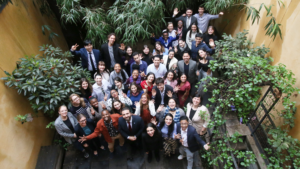How am I going to eat today?
This is a simple and basic question. Unfortunately, many people around the world ask themselves this question every day and, often times, it remains unanswered. The World Bank reports that there were 2 billion people living in extreme poverty in 1990. In 2015, the poverty line was revised– since then a person is considered to live in extreme poverty if he or she is living on less than 1.90 international-$ per day. In the same year, the number of people living in extreme poverty was reduced to 705 million.
This data is good news and I have also seen positive efforts by governments to narrow the gap between the rich and the poor. However, it is evident that poverty and politics are sometimes inseparable. When governments are working on the issue of poverty, they shouldn’t just think of the people as numbers or statistics. Everyone should be treated as individuals who have inviolable and intrinsic dignity.
I’ve been an intern at the WYA Headquarters in New York for over 4 weeks now and WYA never fails to excite me with the opportunities for continual learning. I recently had the opportunity to attend a side event at the 55th session of the United Nations Commission on Social Development. I attended the session on The Poverty of Politics? Pursuing Sustainable Development for All in Challenging Times because of my strong interests in learning about Sustainable Development and International Politics. The speakers shared a lot of interesting insights during the panel discussion especially on the issue of global poverty and the need for governments around the world to have a greater investment in human capital.
I’ve learned that in Scandinavian countries, their governments invest a lot in fundamental needs of the person. Through welfare policies, they are able to support citizens who are unemployed and provide free education to university. I believe that the opportunity to attend school is a great investment which will give their citizens and their family more opportunities and greater hope. In developing countries, like my home country Thailand, governments need to do more work in putting forward policies and programs that are focused on the basic needs of the people. I have seen the government working on the national poverty issues for many years, even decades, now but the situation hasn’t really improved a lot.
WYA’s Declaration on Sustainable Development states that “Our greatest resource is the tremendous potential of the human person. We believe that the person has the capacity to develop the knowledge, skills, and creativity to achieve economic development. We believe that economic development can be achieved through education, vocational training, the promotion of entrepreneurship, innovation, and trade, a greater investment in the creation of employment and a more efficient and creative use of resources. Furthermore, good governance is imperative for social, political, economic and environmental conditions to be conducive to the flourishing of each person. We recognize the critical importance of economic growth and maintain that human flourishing is the ultimate goal of sustainable development.”
As Social Sciences’ student, poverty is something that I should already have a good understanding. However, I believe that no one could completely understand the issue of poverty better than those who have or are still experiencing poverty. Coming up with the right solutions will take a lot of time, money and planning. In coming up with these policies and programs, we need to make sure that the sectors involved are included in the conversation and that these are person-centered.
On of my favorite chapters from the WYA’s Certified Training Program is the 2nd chapter on human dignity where we learn about the I-YOU relationship. It is essential to recognize other human beings as subjects. Sometimes, you’ll meet people who do not see other human beings as subjects. This may have been as a result of their negatives experiences in the past. It is important for us to reach out to them and to share with them the importance of seeing people as subjects regardless of our circumstances in life.
Dalai Lama once said, “Compassion is not religious business, it is human business, it is not a luxury, it is essential for our own peace and mental stability, it is essential for human survival.”
More than great laws and programs, I believe that our world simply needs more compassion.
Written by Parawee Techapermphon, an intern at the WYA Headquarters from Thailand.









